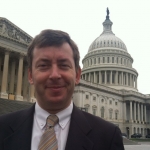Taking it on faith as Republicans hit Bible Belt
Charleston, South Carolina, USA, March 1, 2016 -- US politics and religion have long intertwined despite the official separation of church and state. But seeing it up close when White House hopefuls appeal so openly to people of faith is an eye-opener.
On the campaign trail in South Carolina, I found myself wondering at times whether I had stepped into a political rally or a house of worship as a Republican candidate urged his supporters to pray, quoted from the Bible and received a chorus of "Amens."
During a pitch to voters upstate in Anderson, Ted Cruz turned to scripture, and his audience turned with him.
"If my people, who are called by my name, will humble themselves and pray," began Cruz, a US senator from Texas vying to succeed Barack Obama as president.
While he quoted the Old Testament verse from Second Chronicles 7:14, dozens, perhaps hundreds, in the audience of 1,000 people joined him in reciting the passage from memory.
 A polling station across from the Emanuel African Methodist Episcopal Church in Charleston, South Carolina, on February 20, 2016 (AFP / Jim Watson)
A polling station across from the Emanuel African Methodist Episcopal Church in Charleston, South Carolina, on February 20, 2016 (AFP / Jim Watson)As a non-Christian American who has spent 20 years abroad, I have always been intrigued by the preoccupation with religion in my country's presidential race.
It simmered in 2008, when then-senator Obama caused an uproar by saying some struggling Americans "cling to guns or religion."
I saw it again in 2012, when Mitt Romney, who once served as a leader in the Mormon church, won the Republican nomination but faced intense questions about his beliefs, notably from evangelical Christians, as he tried -- unsuccessfully -- to become the first Mormon president.
Four years later the fixation on faith is back, to the bemusement of the international press corps where some of my colleagues had never seen such public arguments about religion on the political stage.
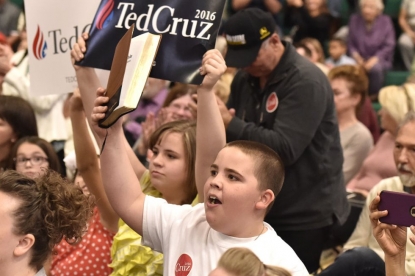 Rhett Sullivan, 10, holds up a Bible while Republican presidential candidate Ted Cruz speaks at a campaign event in Las Vegas, Nevada on February 22, 2016 (AFP / Jim Watson)
Rhett Sullivan, 10, holds up a Bible while Republican presidential candidate Ted Cruz speaks at a campaign event in Las Vegas, Nevada on February 22, 2016 (AFP / Jim Watson)Welcome to the US presidential primaries, where evangelical voters carry extraordinary weight in the early phases of the race.
During a week-long trip across South Carolina this month, our AFP team attended several campaign events that opened with a prayer, and more where Christianity was at the fore.
About three of every four Republican voters in this Bible Belt state describe themselves as evangelical, and many revealed how important a candidate's faith was in their decision-making process.
"He's obviously a man of God, and that's a big part of this," 21-year-old Chance Corbin told me as he stood first in line to hear Cruz speak in Charleston.
 A road near Anderson, South Carolina, on February 16, 2016 (AFP / Jim Watson)
A road near Anderson, South Carolina, on February 16, 2016 (AFP / Jim Watson)Cruz launched his presidential bid last year at Liberty University, which bills itself as the world's largest Christian university.
'Two Corinthians'
Frontrunner Donald Trump, who has called the Bible his favorite book ever, also gave a speech there last month. But he bungled the name of New Testament book Second Corinthians, and voters bristled.
"When he said 'Two Corinthians,' that told me, obviously, he's never read the Bible or maybe even looked at it," Corbin said.
Senator Marco Rubio is seeking to become only the second Catholic president, after John F. Kennedy, and he wore his religion on his sleeve in South Carolina.
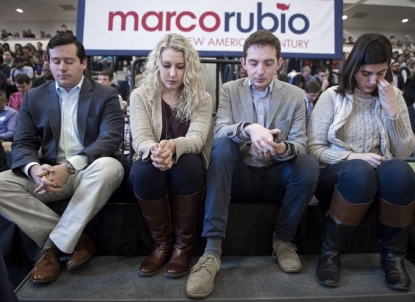 Supporters pause for a prayer shortly before Marco Rubio speaks in Purcellville, Virginia, on February 28, 2016 (AFP / Paul J. Richards)
Supporters pause for a prayer shortly before Marco Rubio speaks in Purcellville, Virginia, on February 28, 2016 (AFP / Paul J. Richards)"My faith is the biggest influence on my life," Rubio told an appreciative crowd in Beaufort days before he placed second in the state behind Trump.
"Might be a game changer," evangelical Christian Susan Brant told me as she joined in giving Rubio a standing ovation. Brant said she had committed to Cruz, but after hearing Rubio's expose on faith, she re-assessed.
Bibles and guns
The overwhelming majority of America's 44 presidents, including all in the last 150 years, have identified as Christian. Only a handful, including Abraham Lincoln, did not specify their faith. None has openly declared himself atheist or agnostic.
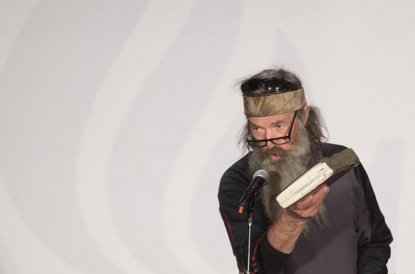 Reality TV's Duck Dynasty star Phil Robertson holds up his Bible during a campaign rally for Ted Cruz in Charleston, South Carolina, on February 19, 2016 (AFP / Jim Watson)
Reality TV's Duck Dynasty star Phil Robertson holds up his Bible during a campaign rally for Ted Cruz in Charleston, South Carolina, on February 19, 2016 (AFP / Jim Watson)Our AFP team was in the balcony of a College of Charleston theater Friday, the day before the Republican primary, when the star of the reality TV show "Duck Dynasty," Phil Robertson, walked onstage dressed in camouflage and carrying a thick Bible.
"I'm for Cruz, because you see this in my hand?" the bearded conservative told the crowd.
"Bibles and guns brought us here, and it will be Bibles and guns that keeps us here. And this man owns them both!" Robertson said, to a prolonged cheer.
I caught the eye of some foreign correspondents in our midst. They, too, were startled.
"Vote godly," Robertson commanded. "It's the only way to roll."
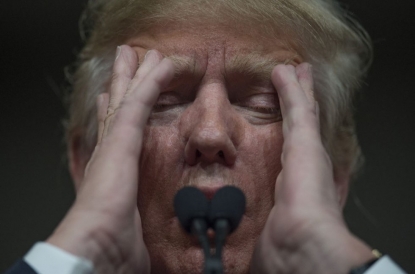 Donald Trump speaks during a campaign rally in North Charleston, South Carolina, on February 19, 2016 (AFP / Jim Watson)
Donald Trump speaks during a campaign rally in North Charleston, South Carolina, on February 19, 2016 (AFP / Jim Watson)Donald Trump added a surreal twist to the religious debate in South Carolina, as he wound up in a spat with Pope Francis for having questioned his Christian faith.
When Trump pushed back, calling the Holy Father's comments "disgraceful," AFP peeled away from Rubio and Jeb Bush events and towards the bombastic billionaire to get his reaction to the controversy. He ended up heaping praise on the pontiff, calling him "a wonderful guy."
As the candidates turned to faith, some religious figures likewise plunged into politics, such as Reverend Isaac Holt of the Royal Missionary Baptist Church.
We paid him a visit on a weeknight in North Charleston, as a police cruiser idled near the church doors.
Charleston's congregations have been on alert since last year, when a white man who was invited into a prayer service at historically black Mother Emanuel AME church pulled out a gun and slaughtered nine people.
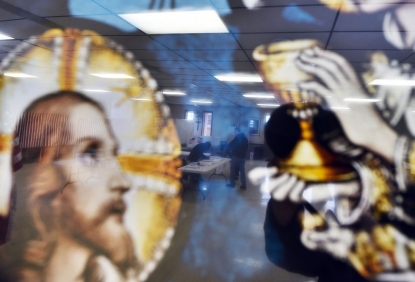 A local resident votes for the first US presidential primary at a church in Concord, New Hampshire, on February 9, 2016 (AFP / Jewel Samad)
A local resident votes for the first US presidential primary at a church in Concord, New Hampshire, on February 9, 2016 (AFP / Jewel Samad)Holt said the community is slowly healing, but the political divide remains, largely along racial lines.
"You don't see any Republicans in my opinion going anywhere where there are a lot of black voters," Holt said. "Politics is what is dividing this nation."
Minutes later we were in the back of Royal Missionary's sanctuary, where rapturous, keyboard-heavy gospel music had churchgoers on their feet, dancing, singing and in some cases convulsing trance-like in the aisles.
"I don't care what the devil says," one of the ministers affirmed to congregants. "As long as you got Jesus, victory is yours!”
Michael Mathes is an AFP reporter based in Washington D.C. Follow him on Twitter (@MichaelMathes).
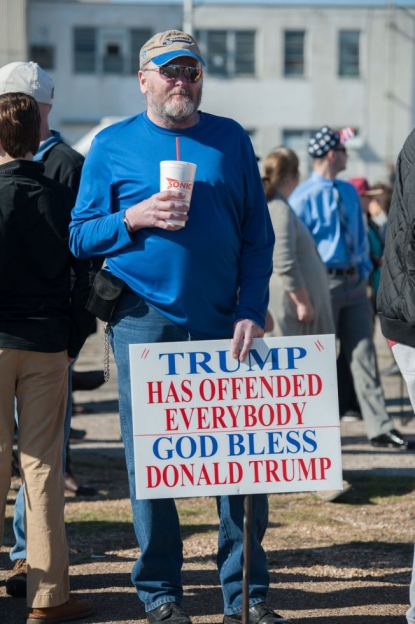 A supporter before a Donald Trump rally on February 27, 2016 in Millington, Tennessee (AFP / Michael B. Thomas)
A supporter before a Donald Trump rally on February 27, 2016 in Millington, Tennessee (AFP / Michael B. Thomas)

